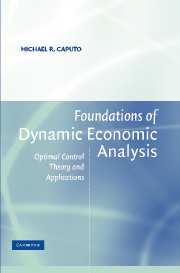Book contents
- Frontmatter
- Contents
- Foreword by Eugene Silberberg
- Preface
- 1 Essential Elements of Continuous Time Dynamic Optimization
- 2 Necessary Conditions for a Simplified Control Problem
- 3 Concavity and Sufficiency in Optimal Control Problems
- 4 The Maximum Principle and Economic Interpretations
- 5 Linear Optimal Control Problems
- 6 Necessary and Sufficient Conditions for a General Class of Control Problems
- 7 Necessary and Sufficient Conditions for Isoperimetric Problems
- 8 Economic Characterization of Reciprocal Isoperimetric Problems
- 9 The Dynamic Envelope Theorem and Economic Interpretations
- 10 The Dynamic Envelope Theorem and Transversality Conditions
- 11 Comparative Dynamics via Envelope Methods
- 12 Discounting, Current Values, and Time Consistency
- 13 Local Stability and Phase Portraits of Autonomous Differential Equations
- 14 Necessary and Sufficient Conditions for Infinite Horizon Control Problems
- 15 The Neoclassical Optimal Economic Growth Model
- 16 A Dynamic Limit Pricing Model of the Firm
- 17 The Adjustment Cost Model of the Firm
- 18 Qualitative Properties of Infinite Horizon Optimal Control Problems with One State Variable and One Control Variable
- 19 Dynamic Programming and the Hamilton-Jacobi-Bellman Equation
- 20 Intertemporal Duality in the Adjustment Cost Model of the Firm
- Index
Foreword by Eugene Silberberg
Published online by Cambridge University Press: 05 June 2012
- Frontmatter
- Contents
- Foreword by Eugene Silberberg
- Preface
- 1 Essential Elements of Continuous Time Dynamic Optimization
- 2 Necessary Conditions for a Simplified Control Problem
- 3 Concavity and Sufficiency in Optimal Control Problems
- 4 The Maximum Principle and Economic Interpretations
- 5 Linear Optimal Control Problems
- 6 Necessary and Sufficient Conditions for a General Class of Control Problems
- 7 Necessary and Sufficient Conditions for Isoperimetric Problems
- 8 Economic Characterization of Reciprocal Isoperimetric Problems
- 9 The Dynamic Envelope Theorem and Economic Interpretations
- 10 The Dynamic Envelope Theorem and Transversality Conditions
- 11 Comparative Dynamics via Envelope Methods
- 12 Discounting, Current Values, and Time Consistency
- 13 Local Stability and Phase Portraits of Autonomous Differential Equations
- 14 Necessary and Sufficient Conditions for Infinite Horizon Control Problems
- 15 The Neoclassical Optimal Economic Growth Model
- 16 A Dynamic Limit Pricing Model of the Firm
- 17 The Adjustment Cost Model of the Firm
- 18 Qualitative Properties of Infinite Horizon Optimal Control Problems with One State Variable and One Control Variable
- 19 Dynamic Programming and the Hamilton-Jacobi-Bellman Equation
- 20 Intertemporal Duality in the Adjustment Cost Model of the Firm
- Index
Summary
I've been basking in Michael Caputo's reflected glory since he was my graduate student in the 1980s, and I am pleased to do it again with the publication of this book. Michael is carrying on the tradition of exploring mathematical models not for their elegance or descriptive qualities, but for the refutable implications they generate. It was Paul Samuelson, who, in 1947, in his Foundations of Economic Analysis, first articulated the methodology that equilibrium conditions themselves were typically unobservable and sterile, and that meaningful theorems in economics consisted of statements that restricted the direction of change of decision variables when the data, or parameters of a system changed in an observable way. In the traditional comparative statics models, such as those I analyzed in the The Structure of Economics, refutable propositions emerged from a maximization hypothesis in a static framework. However, there has never been until now, a treatise that extended Samuelson's methodology to dynamic models, where decisions today affect the entire time path of events in the future.
Michael Caputo's contribution here and elsewhere has been to keep resource and other economists focused on this central issue of scientific methodology so that we can see the scientific usefulness of dynamic models: what refutable implications do they generate? If some initial stock or other parameter in a dynamic resource model, say, increases, under what circumstances can we make a definitive statement about the way the path or terminal conditions of the state and control variables respond?
- Type
- Chapter
- Information
- Foundations of Dynamic Economic AnalysisOptimal Control Theory and Applications, pp. vii - viiiPublisher: Cambridge University PressPrint publication year: 2005
- 5
- Cited by



